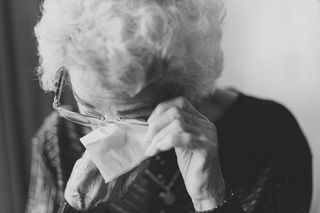
Suicide
The Long Shadow of Suicide
How have I dealt since losing my son 20 years ago? In many ways.
Posted August 2, 2019

Looking back over the 20 years since my son took his own life, I can now see the history of my grief and healing, and what soothed or hurt me as the years passed.
Most people can imagine the anxiety and fear of the first days and months, the deep shock of having someone you're close to take their healthy body and kill it. I was shaken and anxious and had nightmares that woke me in a state of terror for some time.
The memorial we organized for Aaron was healing, a time to share our love and grief with friends and family. Even before it began, it felt good to have everybody greet me with a hug. When people reminisced about Aaron, it brought back the years when he had been well and happy and gave relief from the painful time of his illness, when he had usually been angry, in fact furious, at me and his father.
Since he was living with schizophrenia but was too distrustful to accept treatment, he believed that the voices he heard insulting him, the newscasters who seemed to be talking directly to him, the many other symptoms he suffered were arranged by people we coordinated in order to hurt him. Nothing we could say ever changed this conviction.
For years, I was depressed and hard on myself for a month preceding the anniversary of his death. After it passed, I would be better. I think this annual grieving began to be less painful following the birth of my granddaughter, nine years after Aaron’s death. Her new life gave me the strength to write about Aaron, something I had been unable to do, despite several attempts. My pain had always been too great.
Writing Losing Aaron was also healing. The materials I gathered in preparation for writing included my own journals and Aaron’s, letters and memories from his friends, and folders of his schoolwork. Putting these all together gave me a fuller understanding of how Aaron’s illness had developed, and of his life as a whole.
It was especially good to read Aaron’s thoughts as he recorded them in his high school journals, which brought back the sensible, kind, intelligent person he had been before schizophrenia hit him. Reading his medical records and realizing that his illness and the terrible pain it caused him had begun several years before I recognized it made me upset. But on balance, I was glad to put together his story and make it available to others.
I know that some parents have so much pain at losing a child that they ask their friends not to talk about the child. And some people feel it is their duty to distract a bereaved person from talking about the person they've lost. I felt, on the contrary, that I wanted to reminisce, so I was grateful when people were receptive to my thoughts about him, pleased when those who had known Aaron talked about him, and sad if they failed to mention him.
Silence, in particular, felt like a condemnation, as if the nature of his illness and death made him unspeakable, and it was better to act as if he had never lived. So I was deeply moved last year when I heard from a man who had been close to Aaron at MIT when the two of them were studying physics there. Aaron’s friend had done a search for Aaron and found my blog. He wrote to me at length about Aaron as he had known him, an act of kindness that meant a lot to me.
Because I wanted my granddaughter to know that Aaron had been a beloved member of our family, I would sometimes bring him up in conversation. She was 3 or 4 when she asked what had caused his death.
“He had a bad illness,” I said, which was certainly true, though not the whole truth.
When she was 10, a year ago, we told her more of the story. She was reading the copy on the back of my book about Aaron, which I usually kept out of sight when she was around, to avoid just the sort of question that now came up. I saw her looking at the back cover and decided I wasn’t going to take the book from her this time. She was 10 now, old enough to know the truth.
She turned from the book to me. “Suicide!” she said. “Aaron committed suicide?”
I took a deep breath.
“Yes.”
“Why didn’t you tell me?”
We talked about why (“Would you tell a 5-year-old?” I asked), and how he did it (“Did he strangle himself?” “With a rope.”). She went home and talked to her mother, asking the same questions, getting similar answers. Though she was upset, she didn’t seem overwhelmed.
And the next day, she told a classmate that her uncle had committed suicide. She wasn’t burdened by shame; she didn’t feel Aaron’s death was something that had to be kept secret. And her friend, by a fluke, had had a similar experience. An uncle had taken his own life. Now the two girls had each other. She recently brought this up again when we were talking about Aaron, saying how it helps her to talk with her friend.
Although I’m not a big Facebook person and rarely post about my life, this year I announced on Facebook the day of the 20th anniversary of Aaron’s death. My friends, especially those who had known Aaron, responded with kind thoughts.
I was even more pleased that some of Aaron’s good friends also posted about Aaron. It felt so good to know that they still think of him, that his memory is alive.



